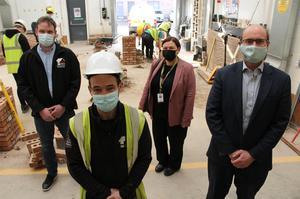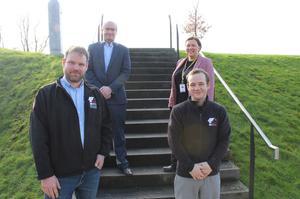Scottish Apprenticeship Week shines a light on the role apprenticeships play in supporting people, employers, and the economy. For the FMB and our members it is construction apprenticeships that play a vital role in supporting and growing Scotland’s construction industry. In Scotland it is small and medium sized firms that train the vast majority of construction apprentices.
Key stats on Scottish apprenticeships
Before we meet three construction apprentices: Liam, Duncan and James, here are some interesting statistics.
In Scotland the latest statistics from Skills Development Scotland for 2021/22 show that the construction and related occupational groupings continued to have the highest proportion of starts at 5034; which is 27.0% of all Modern Apprenticeships. Now some of the terminology and definitions used aren’t the most accessible and I have lost count of how many times I have been asked ‘what exactly is a Modern Apprenticeship?’
Leaving this aside, we should celebrate that the construction apprentices FMB members employ and train are within the occupational grouping which has the highest achievement rate of all occupational groupings. 75.5% of all construction apprentices in Scotland successfully achieved their apprenticeship: this evidence comes from Skills Development Scotland.
What makes Scottish construction apprentices so successful?
The question then is, why does construction come out on top? Part of the answer can be found when we talk with apprentices and their employers.

In February I met Liam Adamson who is an apprentice bricklayer and his employer Peter Archibald the Managing Director of FMB member Haldane Construction Services Ltd at Forth Valley College’s Alloa Campus. I enjoyed a tour of the facilities with Julie Hayward from Foth Valley College and witnessed the high-quality training Liam is benefitting from. I asked Liam why he pursued an apprenticeship in bricklaying and he explained:
“When Peter recommended the Forth Valley College course to me, I was all for it, it looked like a great opportunity to enhance my skills and further my career. One big difference I have already noticed in myself, is in my confidence. Even after the first few weeks of college, I had taken in a lot of information and was able to show this knowledge back on site, both verbally and physically. This gave me a lot of confidence in myself within the workplace.”

Liam praised the support and enthusiasm of his lecturers at the college. Peter Archibald said “We now employ four apprentices within the business and I’m delighted that Liam is progressing so well in his bricklaying course. With high workloads, finding skilled people across all of the trades is very challenging. So Liam and all our apprentices are our home-grown talent for team Haldane. From my conversations with Gordon at the FMB I know that other members across Scotland are as passionate as I am about recruiting and training apprentices.”
Moving around 180 miles north west of where Peter’s firm is based, we find fellow FMB member O’Mac Construction Ltd in Stornoway. Anne Falconer, the office manager kindly put me in touch with two of their apprentices: Duncan Macphail a first-year apprentice joiner and James Morrison a third-year apprentice electrician.

Duncan said: “I've enjoyed the variety of work I've got to do already, I would say to anyone starting an apprenticeship, ask about everything, even if it's not to do with your trade so you can quickly get an understanding of how everything works so that you better understand what you have to do.”

James highlighted the support he receives from O’Mac Construction and told me: “I enjoy working in construction because there is a sense of pride in watching projects be completed from nothing, and for O’Mac in particular because of the variety of work and the amount of interesting projects. I would say to someone wanting to get an apprenticeship to never doubt the value of experience and be patient your ability will improve with experience.
Opportunities for future Scottish apprentices
Earlier I asked, ‘why does construction come out on top?’ From my research and interviews with Liam, Duncan, and James it is through a combination of the support from employers, the quality of training in college and the commitment of the apprentices themselves. Of course, the industry needs more apprentices with the CITB’s Construction Skills Network forecasting that an extra 26,250 new workers are needed in Scotland up to 2025.
As FMB members endeavour to recruit and train more apprentices, the final words come from Liam. “My advice to anyone considering taking up a construction apprenticeship would be to take your chance! Don't waste the opportunity.”







